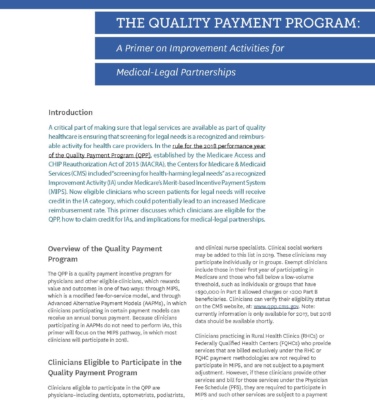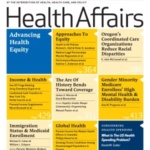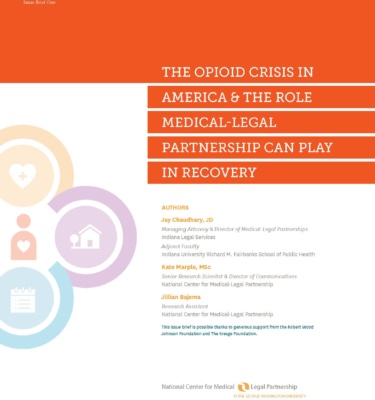Monday, April 2, 2018
In the rule for the 2018 performance year of the Quality Payment Program, the Centers for Medicare & Medicaid Services included “screening for health-harming legal needs” as a recognized Improvement Activity (IA) under Medicare’s Merit-based Incentive Payment System. Now eligible clinicians who screen patients for legal needs will receive credit in the IA category, which could potentially lead to an increased Medicare reimbursement rate. This new primer from the National Center for Medical-Legal Partnership discusses which clinicians are eligible for the Quality Payment Program, how to claim credit for Improvement Activities, and the inherent opportunities for medical-legal partnerships....Read More
Monday, March 5, 2018
This article shares how medical-legal partnerships help treat issues that drive health inequities. The authors identify multiple models for delivering medical-legal partnership services in clinical settings, and examined how health care organizations adapt the intervention to best meet the specific needs of its patients. While the models of delivery vary, the paper's authors also identified eight core elements that define the intervention, and offer recommendations to bring these partnerships to scale....Read More
Thursday, March 1, 2018
This issue brief examines how legal services--delivered alongside medical and behavioral health services--can help support recovery from substance use disorders. The brief highlights case studies of individuals in recovery who were aided by medical-legal partnership services, and looks at how existing programs in Ohio, Indiana, and Nevada work. The brief offers a window into how legal services, integrated into existing recovery efforts, can play a role in alleviating the opioid crisis....Read More
Thursday, January 18, 2018
A study of an intervention among youth with type 1 diabetes, which included medical-legal partnership counsel as a key element, found that 30 percent of youth accepted legal counsel. Youth enrolled in the program were found to demonstrate significant improvement in their glycemic control after one year of the intervention, as compared to youth not enrolled in the program....Read More



